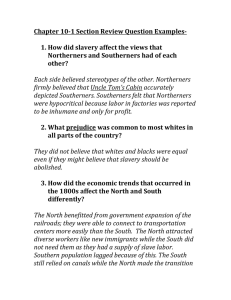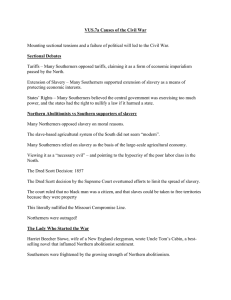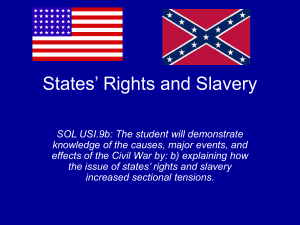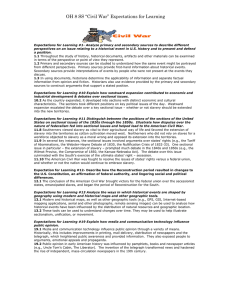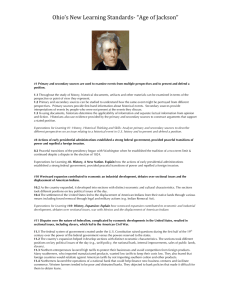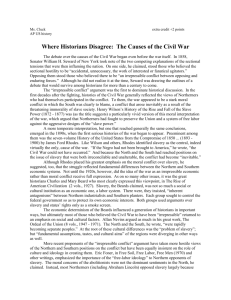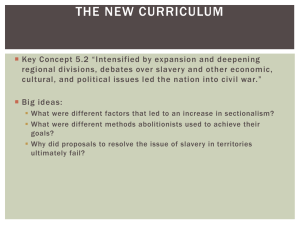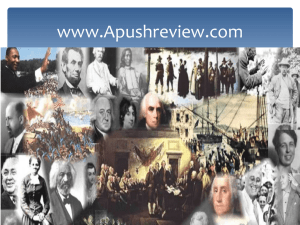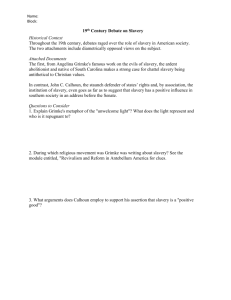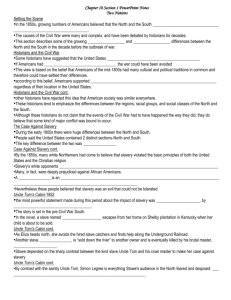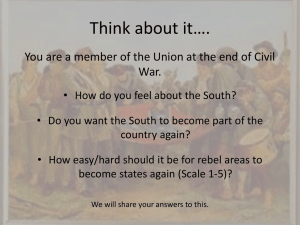Why the Civil War? - americanhistoryrules.com
advertisement
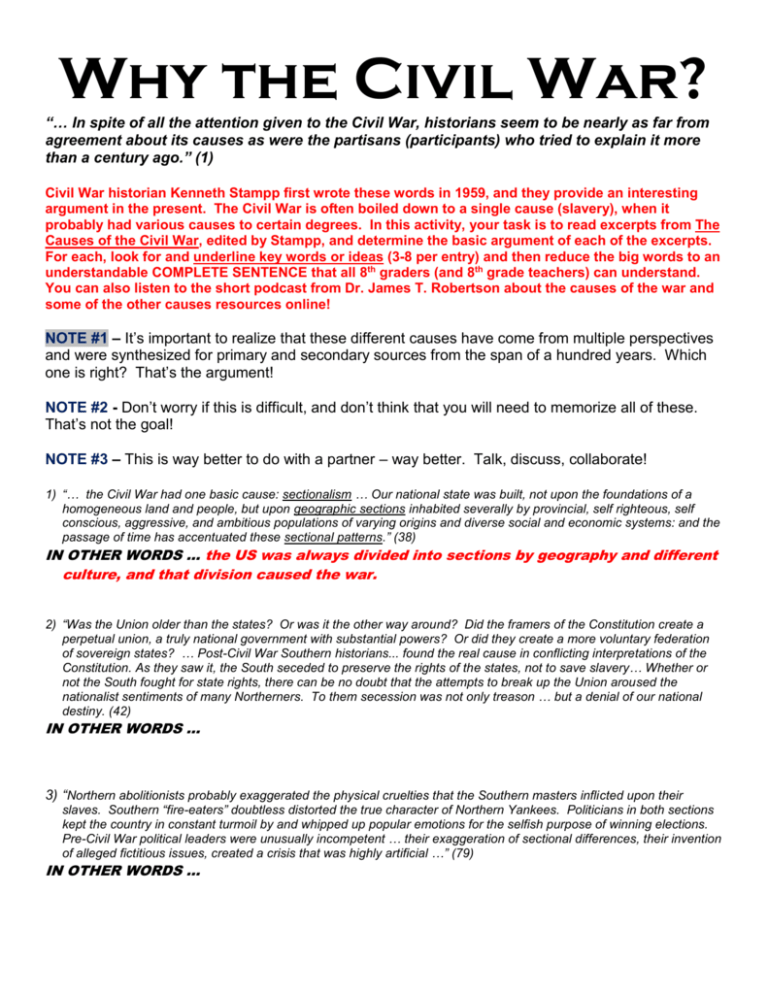
Why the Civil War? “… In spite of all the attention given to the Civil War, historians seem to be nearly as far from agreement about its causes as were the partisans (participants) who tried to explain it more than a century ago.” (1) Civil War historian Kenneth Stampp first wrote these words in 1959, and they provide an interesting argument in the present. The Civil War is often boiled down to a single cause (slavery), when it probably had various causes to certain degrees. In this activity, your task is to read excerpts from The Causes of the Civil War, edited by Stampp, and determine the basic argument of each of the excerpts. For each, look for and underline key words or ideas (3-8 per entry) and then reduce the big words to an understandable COMPLETE SENTENCE that all 8th graders (and 8th grade teachers) can understand. You can also listen to the short podcast from Dr. James T. Robertson about the causes of the war and some of the other causes resources online! NOTE #1 – It’s important to realize that these different causes have come from multiple perspectives and were synthesized for primary and secondary sources from the span of a hundred years. Which one is right? That’s the argument! NOTE #2 - Don’t worry if this is difficult, and don’t think that you will need to memorize all of these. That’s not the goal! NOTE #3 – This is way better to do with a partner – way better. Talk, discuss, collaborate! 1) “… the Civil War had one basic cause: sectionalism … Our national state was built, not upon the foundations of a homogeneous land and people, but upon geographic sections inhabited severally by provincial, self righteous, self conscious, aggressive, and ambitious populations of varying origins and diverse social and economic systems: and the passage of time has accentuated these sectional patterns.” (38) IN OTHER WORDS … the US was always divided into sections by geography and different culture, and that division caused the war. 2) “Was the Union older than the states? Or was it the other way around? Did the framers of the Constitution create a perpetual union, a truly national government with substantial powers? Or did they create a more voluntary federation of sovereign states? … Post-Civil War Southern historians... found the real cause in conflicting interpretations of the Constitution. As they saw it, the South seceded to preserve the rights of the states, not to save slavery… Whether or not the South fought for state rights, there can be no doubt that the attempts to break up the Union aroused the nationalist sentiments of many Northerners. To them secession was not only treason … but a denial of our national destiny. (42) IN OTHER WORDS … 3) “Northern abolitionists probably exaggerated the physical cruelties that the Southern masters inflicted upon their slaves. Southern “fire-eaters” doubtless distorted the true character of Northern Yankees. Politicians in both sections kept the country in constant turmoil by and whipped up popular emotions for the selfish purpose of winning elections. Pre-Civil War political leaders were unusually incompetent … their exaggeration of sectional differences, their invention of alleged fictitious issues, created a crisis that was highly artificial …” (79) IN OTHER WORDS … 4) “… many Americans, even some Southerners, of the pre-Civil War generation looked upon slavery as a national disgrace and a great moral evil … in 1861, countless Northerners accepted war as an effective means of removing the curse of slavery and of creating a better and purer nation. Given such high moral purposes, they conclude that the war, whose prime cause was slavery, was both inevitable and justifiable.” (101) IN OTHER WORDS … 5) “In seeking the causes of the Civil War, … one must consider the basic differences between the economies of the two great sections, the numerous practical issues upon which sectional leaders were divided. It was opposition to the protective tariff that drove South Carolina to rebellion in 1832; it was the fact that Southerners repeatedly blocked internal improvement bills that caused many Northerners to denounce the Slave Power so violently … slavery and slavery expansion were, after all, economic as well as moral problems, for slavery was a labor system and represented a large investment of Southern capital.” (63) IN OTHER WORDS … 6) “… it would be easy to exaggerate the differences between Northern and Southern culture, the differences existed nonetheless, and [many] have used them to help explain the sectional crisis … Sectional [supporters] stressed these cultural differences, [resentfully] compared their society with the other, and proudly proclaimed the superiority of their own. To Northerners the South was backward, semi civilized, and out of harmony with the ideals of the nineteenth century. To Southerners the North was a hotbed of radical “isms” (feminism, abolitionism, and socialism, among others), of puritan hypocrisy …each section reduced the other to a cultural stereotype and made it an object of hatred.” (152) IN OTHER WORDS … 7) “One way of viewing the Civil War … is as “a complete breakdown of the democratic process.” Southern secessionists maintained that democracy failed because Northerners did not understand its true nature. They affirmed that rule by a majority free to trample upon the rights of minorities is not democracy but tyranny. Northerners, on the other hand, argued that the South … demanded that a minority be given the right to dictate to the majority. To them Southern secession represented a refusal to abide by the results of a democratic election and a [denial] of a fundamental principle upon which democracy is based.” (140) IN OTHER WORDS … So – if there is no agreement on the cause or causes of the Civil War, why should we look at them? “As one reflects upon the problem of causation, one is driven to the conclusion that historians will never know … what caused the Civil War… [but] uncertainty about the war’s causes has driven historians back to the sources time and time again, with the result that we have gradually enlarged our knowledge and deepened our understanding of our greatest national crisis”. (3) LAST THING TO THINK ABOUT – COULD THE US HAVE BEEN TALKED OFF THE “EDGE OF THE PRECIPICE” IN THE 1850s?
